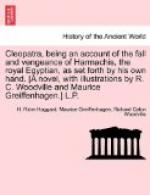I stood still and felt the blind eyes wandering over me. I could not speak to him—I dared not speak to him; I would go and hide myself afresh.
I had already turned and grasped the curtain, when my father spoke in a deep, slow voice:
“Come hither, thou who wast my son and art a traitor. Come hither, thou Harmachis, on whom Khem builded up her hope. Not in vain, then, have I drawn thee from far away! Not in vain have I held my life in me till I heard thy footfall creeping down these empty Holies, like the footfall of a thief!”
“Oh! my father,” I gasped, astonished. “Thou art blind: how knowest thou me?”
“How do I know thee?—and askest thou that who hast learned of our lore? Enough, I know thee and I brought thee hither. Would, Harmachis, that I knew thee not! Would that I had been blasted of the Invisible ere I drew thee down from the womb of Nout, to be my curse and shame, and the last woe of Khem!”
“Oh, speak not thus!” I moaned; “is not my burden already more than I can bear? Am I not myself betrayed and utterly outcast? Be pitiful, my father!”
“Be pitiful!—be pitiful to thee who hast shown so great pity? It was thy pity which gave up noble Sepa to die beneath the hands of the tormentors!”
“Oh, not that—not that!” I cried.
“Ay, traitor, that!—to die in agony, with his last poor breath proclaiming thee, his murderer, honest and innocent! Be pitiful to thee, who gavest all the flower of Khem as the price of a wanton’s arms!—thinkest thou that, labouring in the darksome desert mines, those noble ones in thought are pitiful to thee, Harmachis? Be pitiful to thee, by whom this Holy Temple of Abouthis hath been ravaged, its lands seized, its priests scattered, and I alone, old and withered, left to count out its ruin—to thee, who hast poured the treasures of Her into thy leman’s lap, who hast forsworn Thyself, thy Country, thy Birthright, and thy Gods! Yea, thus am I pitiful: Accursed be thou, fruit of my loins!—Shame be thy portion, Agony thy end, and Hell receive thee at the last! Where art thou? Yea, I grew blind with weeping when I heard the truth—sure, they strove to hide it from me. Let me find thee that I may spit upon thee, thou Renegade! thou Apostate! thou Outcast!”—and he rose from his seat and staggered like a living Wrath toward me, smiting the air with his wand. And as he came with outstretched arms, awful to see, suddenly his end found him, and with a cry he sank down upon the ground, the red blood streaming from his lips. I ran to him and lifted him; and as he died, he babbled:
“He was my son, a bright-eyed lovely boy, and full of promise as the Spring; and now—and now—oh, would that he were dead!”
Then came a pause and the breath rattled in his throat.
“Harmachis,” he gasped, “art there?”
“Yea, father.”
“Harmachis, atone!—atone! Vengeance can still be wreaked—forgiveness may still be won. There’s gold; I’ve hidden it—Atoua—she can tell thee—ah, this pain! Farewell!”




